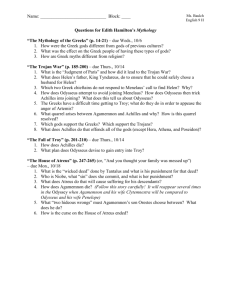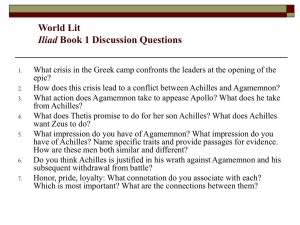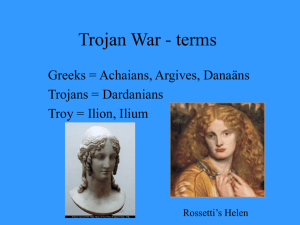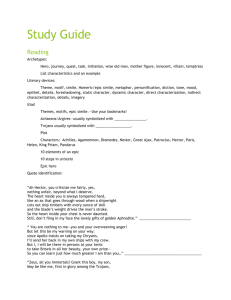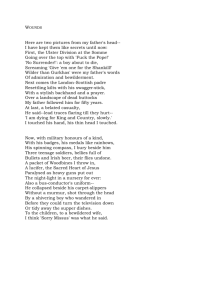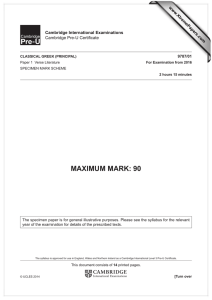9787 CLASSICAL GREEK MARK SCHEME for the May/June 2013 series
advertisement
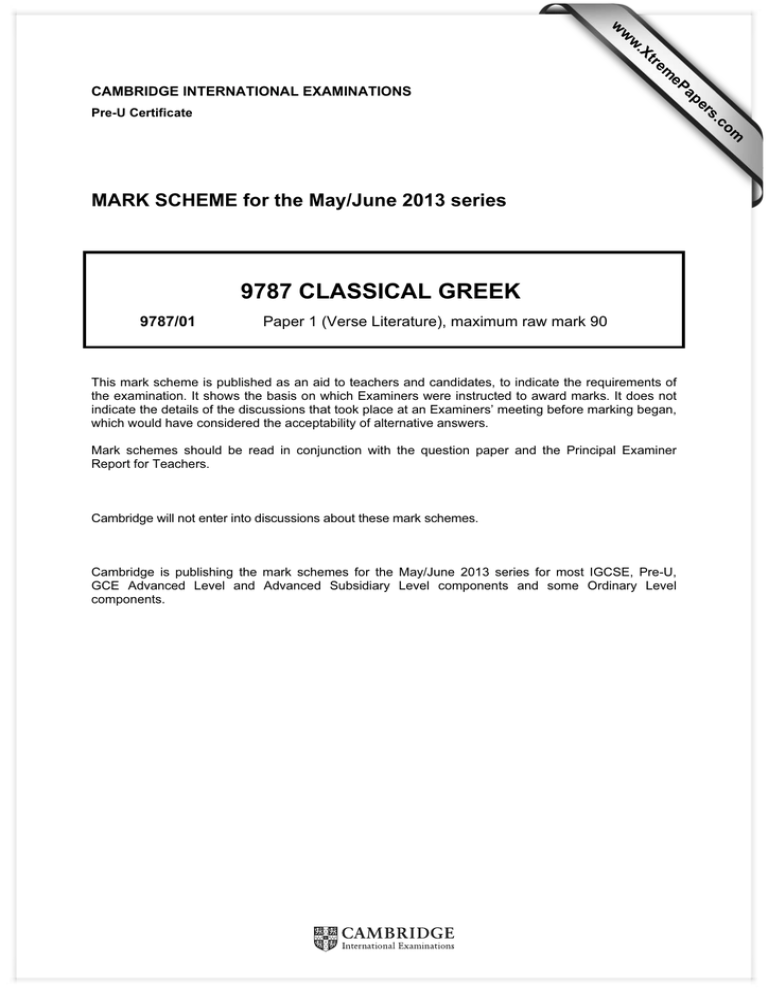
w w ap eP m e tr .X w CAMBRIDGE INTERNATIONAL EXAMINATIONS s er om .c Pre-U Certificate MARK SCHEME for the May/June 2013 series 9787 CLASSICAL GREEK 9787/01 Paper 1 (Verse Literature), maximum raw mark 90 This mark scheme is published as an aid to teachers and candidates, to indicate the requirements of the examination. It shows the basis on which Examiners were instructed to award marks. It does not indicate the details of the discussions that took place at an Examiners’ meeting before marking began, which would have considered the acceptability of alternative answers. Mark schemes should be read in conjunction with the question paper and the Principal Examiner Report for Teachers. Cambridge will not enter into discussions about these mark schemes. Cambridge is publishing the mark schemes for the May/June 2013 series for most IGCSE, Pre-U, GCE Advanced Level and Advanced Subsidiary Level components and some Ordinary Level components. Page 2 1 Mark Scheme Pre-U – May/June 2013 Syllabus 9787 Paper 01 (i) Achilles and Apollo. [2] (ii) Lines 2–3 [5]; lines 4–5 [5]; lines 6–7 [5]. 15 divided by 3 = [5] (iii) The following points could be made: [7] • • • • 8–10; he did accompany Odysseus, even though unsure whether he was being told the truth (this could show Neoptolemus as sceptical/intelligent); reveals weakness in his armoury (mention of his father); 13–14: does not hesitate for long (ambitious, eager for glory, hero); filial piety in 15–17; eagerness for glory again in 18. (iv) Note: • • • • 2 pikron in 20; 21–3: army surrounding him, noting likeness to Achilles; some joy; 24–7: sadness and incipient anger; loss of father; loss of his arms; specifically in 26 and 27, the contrast between acceptance of initial rightness of the Atreidae’s approach and what they then said; 29-31: who has Achilles’ arms: name delayed for effect. (i) Clearly angry with Odysseus, and shocked at Odysseus’ opportunism and lack of a moral dimension. Note esp. in this instance lines 2–3, the pejorative comparison of Odysseus to the snake that caused Philoctetes’ wound in lines 4–5; summary of O’s character in lines 6–7; sense of urgency in the latter lines. [12] (ii) All relevant points taken into account. Neoptolemus seems less willing to get moving than Philoctetes, who is a little gung-ho. Neoptolemus is careful towards Philoctetes, not wanting to upset him, allowing him to overrule him as to whether to sail, and allowing him to collect what he needs. Webster (ad loc.): ‘Neoptolemus’ hesitation after his haste in 464 is nonsense in the fictitious situation made by the Emporos; it must belong to the real situation, his dislike of tricking Philoctetes.’ [8] (iii) 5 marks for each couplet = 15, divided by 3 = 5 © Cambridge International Examinations 2013 [5] Page 3 3 Mark Scheme Pre-U – May/June 2013 Syllabus 9787 Paper 01 (i) 1–5: Achilles’ torn emotions; stark choice between violence or capitulation; [10] Lines 6–7: he has made his decision; he is starting to draw his sword (note the tense of the verb): emphasis of kata (twice); Lines 7–9: appearance of Athene – dramatic divine intervention; feelings of the gods; Lines 10–11: the great hero has his hair pulled: shocking image; yellow hair; no one else saw; Lines 12–13: Achilles’ shocked response. (ii) Lines 15–18: Achilles speaks directly, referring to Agamemnon’s hubris, and his own plans to dispatch him as quickly as possible. [10] Line 20: Athene refers to Achilles’ anger (remember the opening line); Lines 21–2: repetition here of lines 8–9, stressing where Athene has come from, and her feelings (and those of Hera) for the two men; Line 23: short, sharp command; Line 25: I have authority; Lines 26–7: you will be persuaded by me. (iii) Line 28 = 3; lines 29-30 = 4; Line 31 = – 3; lines 32–4 =5. 15 in total, divided by 3 = 4 [5] (i) Nestor’s plan seems to be: I will tell these two (youngish) men that I used to deal with really great heroes from some time ago (appropriate references required); [12] • • • for that reason I should be respected. Not only that, those really great heroes listened to me. Therefore, so should you. It might be a good argument, but there is at least a possibility that both Agamemnon and Achilles might find it offensive. [And: it doesn’t work.] (ii) Lines 17–18 [4 marks]; 19–21 [7 marks]; 22–23 [4 marks] = 15 divided by 3 = [5] (iii) Necessary to state the importance of Neoptolemus’ conclusion: (a) Agamemnon, you should stop being angry; (b) it’s me, Nestor, who is talking (egoge) and who is begging Achilles to stop being angry; (c) Achilles is really important. Homeric concept of time (honour/respect): Agamemnon almost bound to be offended. However, note the politeness of line 28; extravagant dismissal of Achilles’ ambition, and certain description of Agamemnon’s refusal to give way. He is a king, after all. 5 This is really a consideration of Philoctetes as a tragic hero. Some points to be discussed: • • • • what is a tragic hero? If P cannot yield, why not? Is it to do with his character, his earlier treatment, or the people who have come to see him? What does it mean by ‘break’? And does he break? © Cambridge International Examinations 2013 [8] Page 4 6 the nature of plot; the different main characters (Neoptolemus, Philoctetes, Odysseus); the (apparent) strangeness and lack of development in the plot; the way that the play is about: will P. be persuaded or not? Which way will P. choose to travel? Agamemnon’s attempts to manage, lord it over Achilles; the way that Zeus reacts to a) Thetis’ supplication; b) to the intervention of other gods; the different problems faced by the two leaders: Zeus is clearly physically stronger than the other gods; Agamemnon is not physically stronger than Achilles. The following could be noted: • • 9 Paper 01 One might see the following: • • • 8 Syllabus 9787 Candidates probably need to explore: • • • • 7 Mark Scheme Pre-U – May/June 2013 there a number of ways in which book 1 could be seen as self-contained: Achilles’ anger, the dramatic intervention by the gods, Achilles’ withdrawal, Thetis’ supplication, further divine intervention, the council of the gods; on the other hand, it could be argued that book 1 establishes what will be important for the rest of the poem: the extraordinariness of Achilles; the nature of heroism; the relations between humans and gods; the plot effects of Achilles’ absence; the importance of fate. (i) There is the opening ‘ea’, which normally suggests surprise and sometimes distress. Bizarrely obvious observations of lines 1–2; note in particular the use of ‘men’ (not picked up by a ‘de’ later), meaning something like ‘at any rate’. The latter part of line 1 shows that H. – having ceased to be deluded – is concentrating on the obvious, familiar things; the ‘empnous’ anticipates line 4; appropriate metaphor of toxa in line 2; clear explanation of turbulence in lines 3–5 (wave, disturbance); this marks a change of attitude from the opening two lines (I may not be deluded …) metaphor and literal description of lines 6–9 (ship/masonry); subtlety of ‘half-ruined’; the horrible juxtaposition of corpses/neighbours. (ii) H. as great hero considers what might be happening to him. He recalls various earlier labours – scenes of triumph; the weapons he used; the explicit verbs of line 17; the sense of abandonment or loneliness in line 18; lines 19–20: the first words of this final couplet. The last few lines demonstrate a real sense of abandonment. This is Heracles, the great hero – stunned, at a loss, bereft of friends, befuddled (this last emphatically stated); the series of questions stresses his uncertainty. Overall, the pathos through the contrast between Heracles as hero and his current state. © Cambridge International Examinations 2013 Page 5 Mark Scheme Pre-U – May/June 2013 Syllabus 9787 Paper 01 10 Appropriate and relevant reference required, for instance: • • • • • Philoctetes’ refusal to take into account Greek feelings; Medea’s infanticide; Ajax’s suicide; but Oedipus’ blindness; the feelings/attitudes of various communities who attempt to accommodate these heroes. 11 Some examples/episodes that might be considered: • • • • Ajax’s suicide; Medea’s great speech of indecision; Philoctetes’ confusion about Neoptolemus’ motives; Oedipus and the confusion between his status as hero as instransigent; hero as detective. 12 There are various ways to discuss this question. • • • • • Philoctetes is clearly alone and has been for some time; he is marked out by his foot; Medea’s special qualities are ‘intellectual’ rather and physical; she is anyway not Greek; Ajax – bulwark of the Greeks – hates some of them; says one thing and does another; Oedipus’ heroism is partly intellectual. 13 This seems to be a point about generic convention. That is, tragic heroes are not free to act in any way they like, but must rather take the extreme, ‘heroic’ course. Any examples of the above will help. 14 Candidates need to explain both ‘crucial’ and ‘humane’. The former is easier: • various interventions (Achilles and Agamemnon); Whether humane or not is a matter of evaluation but note: • • calculations of fate; divine favourites. 15 The following could be noted: • • • more gods in the Iliad; more frequent mentions of fate in the Iliad; the effect of the above on the representation of human motivation and decision-making. 16 The following areas are of interest: • • • • is Zeus in control or not? the problem initiated by Thetis; uses of the various words and idioms of fate; fate at different levels. © Cambridge International Examinations 2013 Page 6 Mark Scheme Pre-U – May/June 2013 Syllabus 9787 Paper 01 17 The key thing here is: • • • • • the human realm may be more important because humans die, so their actions matter; the frivolity of gods; but the importance of gods in human actions; different knowledges of fate; humans as tragic. © Cambridge International Examinations 2013
